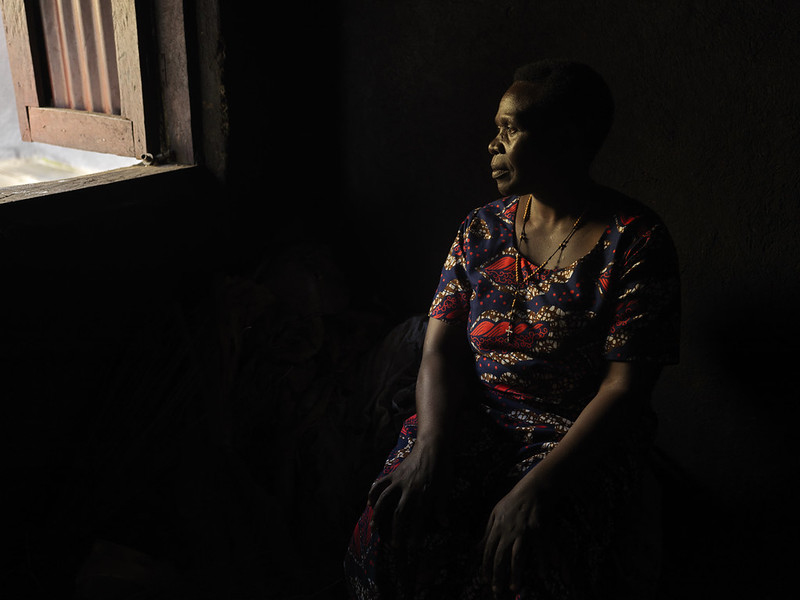
It was five years ago when Margaret Kugonza’s husband died after spending just a few days in the hospital. “The doctor asked to see me after his funeral,” Margaret recalls. “I went and they did an HIV test.”
Upon learning she tested positive for HIV, “my heart almost stopped,” Margaret says.
She started antiretroviral therapy (ART) at a comprehensive care clinic close to her home in western Uganda, an area of high HIV prevalence.
Providers explained that if she took her ART as prescribed, the treatment would reduce the amount of HIV in her body and help her to stay healthy.
Still, as a mother of four children, she had questions and worries. “I had a grocery shop that kept me busy during the day, but my thoughts kept me awake at night. I could not eat or sleep because of thinking about the children and my future.”
Unable to manage the stress, she closed her shop. Adhering to ART seemed pointless.
“I felt useless and stopped taking the medication,” she says. “I wanted to end my life. One day I took poison, but my aged mother found me and called for help. She begged me to go for counseling.
Margaret Kugonza

That’s how Margaret met Nurse Biira Levinah, an assistant psychiatric nursing officer at Fort Portal Regional Referral Hospital. Biira had been trained in the Common Elements Treatment Approach (CETA), which enables frontline care givers to integrate evaluation and diagnosis for depression, anxiety, substance abuse and trauma- and stress-related disorders into HIV care and treatment.
“She got my attention,” Margaret says, “when she looked straight into my eyes and said, ‘Margaret, I want you to live.’”

Biira would call to check on Margaret—and more.
“She asked me to call her whenever I had bad thoughts,” Margaret says and recalled they would often walk together during counseling sessions.
Biira is one of 55 CETA-trained counselors working at seven health facilities in western Uganda. Their training was supported by the Global Reach II project, funded by the American Rescue Plan Act through the U.S. Health Resources and Services Administration, in partnership with the Uganda Ministry of Health, Mental Health and Substance Abuse Division. Developed for use by non-mental health professionals working in low- and middle-income settings, CETA is offered on the front lines of care by nurses as well as community health volunteers, expert clients, clinical officers, midwives and social workers, all of whom learned to use CETA’s brief, multi-purpose tool, which can be adapted for their community.
Where Margaret lives, the need for mental health treatment is great and resources are lacking.

A World Health Organization report cites studies showing that people living with HIV are twice as likely to experience severe depression compared with others and that the risk of death by suicide is 100 times higher in people living with HIV than in the general population. The report also notes that treating depression can help people continue on treatment and improve clinical outcomes.
And, despite progress in achieving two of the three global HIV 95-95-95 testing, treatment and viral suppression targets, Uganda faces challenges in viral suppression due to prevalent mental disorders; depression affects up to 30 percent of people living with HIV.

“In a setting where resources are scarce, our commitment to integrating mental health services into HIV care isn’t just about treating conditions; it’s about empowering individuals,” says Jhpiego program officer Charles Mwanje, who oversees CETA’s implementation in Uganda.

Trained to use a number of approaches for managing a range of mental health conditions, Nurse Biira helped Margaret to recognize self-defeating thoughts and then to counter them while developing solutions. This cognitive restructuring approach, called “Think in a Different Way,” resonated with Margaret. The darkness lifted.
“I would be dead if it wasn’t for Biira’s support,” she says. “She guided me to ‘see myself’ again. The way I think about myself has changed.”
Fully functional and happily alive, Margaret says, “I take my medicine, and I am in good health.
“I am living with my mother and children, farming my sweet potatoes, beans and vegetable garden.”

“I feel happy that I have changed someone’s life, and I can’t wait to apply my skills to as many clients as possible.”
Nurse Biira Levinah

Josephine Watuulo is the Knowledge Management Coordinator in Jhpiego’s Uganda office. Joan Nduta, Senior Communications Manager, Africa Region, and Maryalice Yakutchik, senior writer with Jhpiego, also contributed to this article. Photos by Peter Caton for Jhpiego.



